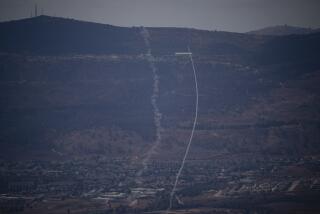Battle in Gaza is now political
GAZA CITY — After four days of brutal street battles, Palestinians on Friday found themselves facing the prospect of two competing governments when Palestinian Authority President Mahmoud Abbas named a political independent respected by the U.S. and Israel as prime minister but the victorious Hamas movement refused to step aside.
Leaders of the Islamic movement, now with exclusive dominion over the Gaza Strip after defeating Abbas’ security forces, sent conciliatory signals. Ismail Haniyeh, the Hamas leader whom the president fired as prime minister a night earlier, appealed for calm even as he refused to give up his post.
There was scattered violence in Gaza and the West Bank, where Abbas’ Fatah movement remained in control. Looters in Gaza ransacked Abbas’ presidential headquarters and several battle-scarred compounds once controlled by security forces led by Fatah. A shooting during a Hamas rally in the coastal strip killed one of the Islamist movement’s supporters.
But days of combat that left more than 90 people dead were largely replaced by a quiet dread among Gaza’s 1.5 million residents that their impoverished enclave would end up more isolated by the world as a result of Hamas’ military victory.
Hamas released 10 senior Fatah leaders and announced a prisoner amnesty to quell worries of retributive violence against its political rivals. Among the Fatah officials who were detained a day earlier were Tawfiq abu Khoussa, a spokesman, and Majed abu Shammala, a lawmaker who is the party’s leader in Gaza.
Hamas and Fatah forces had been clashing for weeks, despite a unity government put in place in March that included politicians from both movements. This week, Hamas fighters launched a full-scale offensive that overwhelmed the security forces loyal to Fatah.
In the wake of the violence, Abbas named Salam Fayyad, a U.S.-educated economist who twice served as finance minister, to head an interim government that under Palestinian law can serve for 30 days without approval by the Hamas-led parliament.
Fayyad, a political moderate who favors negotiations with Israel, was credited during the reign of the late Yasser Arafat with spearheading reforms to make Palestinian financial transactions more transparent.
He quit the finance post to run for the Palestinian parliament in 2006, but returned when Hamas and Fatah agreed to share power under Haniyeh. That union failed to persuade Western nations to drop their aid boycott against the Hamas-led government. But the embargo may be lifted for the West Bank once the emergency government is in place since it will not include the Islamist movement.
Hamas officials in Gaza said Friday that they would refuse to deal with the emergency government, and Haniyeh declared that he remained in charge.
Officials from the U.S., Russia, the United Nations and the European Union, which collectively have pursued peace talks as the quartet, consulted by telephone Friday and later joined the Bush administration in backing Abbas.
“There was a clear message of support to President Abbas especially in this difficult time of forming an emergency government,” said a spokeswoman for EU foreign policy chief Javier Solana, according to Reuters news service.
A ‘difficult proposition’
In Washington, State Department spokesman Sean McCormack said, “In our view, the Palestinian government that is being formed by Prime Minister Salam Fayyad is the Palestinian government for all Palestinians, including those in Gaza.” But he added that “in practical terms, that’s a very difficult proposition.”
Hamas has made clear that it intends to focus on restoring order following months of lawlessness in Gaza. Soon after Hamas completed its takeover, Haniyeh urged captors to release BBC correspondent Alan Johnston, who was abducted in March by gunmen believed to belong to a clan with a history of criminal activities.
In the West Bank, masked members of the Fatah-led security forces gathered in large numbers in Ramallah, one of several displays of strength by official forces and the Al Aqsa Martyrs Brigade, a Fatah-linked militia.
Hamas reported attacks on a cleric and a school principal in the Ramallah area and said several of its offices elsewhere in the West Bank had been ransacked, fired upon or set ablaze.
As the standoff continued, Israel signaled that it was willing to make conciliatory moves in the West Bank to help Abbas and other relatively moderate Palestinians.
Among the ideas under consideration was to release some of the $500 million to $600 million in tax and customs revenue that Israel has collected on behalf of the Palestinian Authority but withheld since Hamas came to power early last year.
Olmert, Bush to meet
Israeli Prime Minister Ehud Olmert is expected to discuss possible moves when he meets with President Bush in Washington next week.
The United States and the European Union classify Hamas as a terrorist group. They cut off direct aid to the Palestinian Authority when the Hamas-led government would not recognize Israel, renounce violence and agree to abide by past Israeli-Palestinian agreements.
Israeli officials said Friday that they would not deal with Hamas until it met those three conditions, but would consider ways to help Abbas, whose rule for now is in effect limited to the West Bank.
“Israel wants to engage with Palestinian moderates who believe in peace,” said Mark Regev, spokesman for the Israeli Foreign Ministry.
“There is a chance for expanded cooperation with the moderate Palestinians.”
Special correspondent Abu Alouf reported from Gaza City and Times staff writer Ellingwood from Jerusalem. Special correspondent Maher Abukhater in Ramallah contributed to this report.
More to Read
Sign up for Essential California
The most important California stories and recommendations in your inbox every morning.
You may occasionally receive promotional content from the Los Angeles Times.










